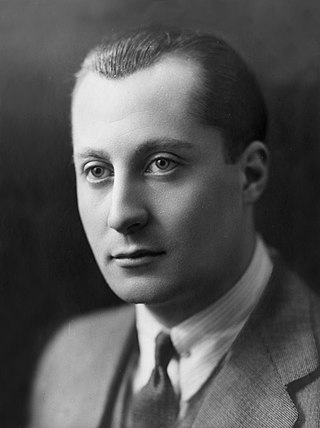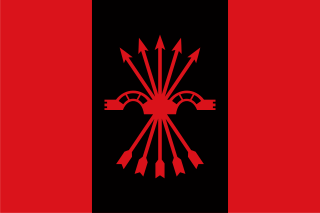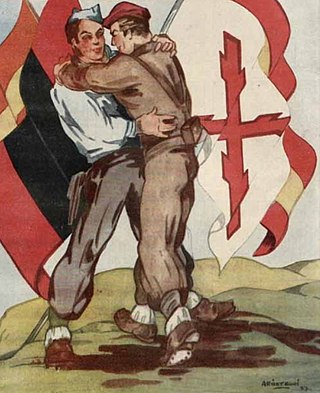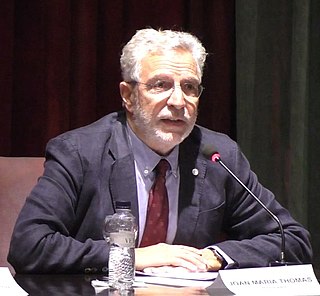
The Falange Española de las Juntas de Ofensiva Nacional Sindicalista, was a fascist political party founded in Spain in 1934 as merger of the Falange Española and the Juntas de Ofensiva Nacional-Sindicalista. FE de las JONS, which became the main Fascist group during the Second Spanish Republic, ceased to exist as such when, during the Civil War, General Francisco Franco merged it with the Traditionalist Communion in April 1937 to form the similarly named Falange Española Tradicionalista y de las JONS.

José Antonio Primo de Rivera y Sáenz de Heredia, 1st Duke of Primo de Rivera, 3rd Marquess of Estella GE, often referred to simply as José Antonio, was a Spanish politician who founded the falangist Falange Española, later Falange Española de las JONS.

Movimiento Nacional was a governing institution of Spain established by General Francisco Franco during the Spanish Civil War in 1937. During Francoist rule in Spain, it purported to be the only channel of participation in Spanish public life. It responded to a doctrine of corporatism in which only so-called "natural entities" could express themselves: families, municipalities and unions. It was abolished in 1977.

Falangism was the political ideology of two political parties in Spain that were known as the Falange, namely first the Falange Española de las Juntas de Ofensiva Nacional Sindicalista and afterwards the Falange Española Tradicionalista y de las Juntas de Ofensiva Nacional Sindicalista. Falangism has a disputed relationship with fascism as some historians consider the Falange to be a fascist movement based on its fascist leanings during the early years, while others focus on its transformation into an authoritarian conservative political movement in Francoist Spain.

Falange Española was a Spanish fascist political organization active from 1933 to 1934.
Falange Auténtica is a Falangist political party in Spain. FA emerged in 2002 as a split from FE/La Falange. FA claims to represent the heritage of the dissolved Falange Española de las JONS (Auténtica) (FE-JONS).

The Falange Española Tradicionalista y de las Juntas de Ofensiva Nacional Sindicalista, frequently shortened to just "FET", was the sole legal party of the Francoist regime in Spain. It was created by General Francisco Franco in 1937 as a merger of the fascist Falange Española de las JONS with the monarchist neo-absolutist and integralist Catholic Traditionalist Communion belonging to the Carlist movement. In addition to the resemblance of names, the party formally retained most of the platform of FE de las JONS and a similar inner structure. In force until April 1977, it was rebranded as Movimiento Nacional in 1958.
Falangism in Latin America has been a feature of political life since the 1930s as movements looked to the national syndicalist clerical fascism of the Spanish state and sought to apply it to other Spanish-speaking countries. From the mid-1930s, the Falange Exterior, effectively an overseas version of the Spanish Falange, was active throughout Latin America in order to drum up support among Hispanic communities. However, the ideas would soon permeate into indigenous political groups. The term "Falangism" should not be applied to the military dictatorships of such figures as Alfredo Stroessner, Augusto Pinochet and Rafael Trujillo because while these individuals often enjoyed close relations to Francisco Franco's Spain, their military nature and frequent lack of commitment to national syndicalism and the corporate state mean that they should not be classed as Falangist. The phenomenon can be seen in a number of movements both past and present.

Raimundo Fernández-Cuesta y Merelo was a leading Spanish politician with both the Falange and its successor movement the Spanish Traditionalist Phalanx of the Assemblies of National-Syndicalist Offensive.

The Sección Femenina was the women's branch of the Falange political movement in Spain. Founded in July 1934 as part of the Sindicato Español Universitario (SEU) of the Falange Española de las JONS, and fully incorporated to FE de las JONS later in the year, it remained as part of the FET y de las JONS following the 1937 Unification Decree, subsequently becoming an official institution of the single-party of the Francoist dictatorship. Following General Franco's death and the beginning of the transition to democracy it was disbanded on 1 April 1977 together with all Movimiento Nacional institutions. Sección Femenina was led throughout its history by Pilar Primo de Rivera, the younger sister of Falange Española founder José Antonio Primo de Rivera.

The National Council of the Movement, was an institution of the Franco dictatorship of a collegiate nature, which was subordinated to the Head of State. Originally created under the name of the National Council of FET and the JONS on 19 October 1937 in the midst of the Civil War, it would continue to exist until 1977, following the death of Francisco Franco and the dismantling of institutions of his regime.
Falange Española de las JONS is a Spanish political party registered in 1976, originating from a faction of the previous Falange Española Tradicionalista y de las Juntas de Ofensiva Nacional Sindicalista. The word Falange is Spanish for phalanx. Members of the party are called Falangists. The main ideological bases of the party are national syndicalism, Third Position and ultranationalism.

Falange Española Independiente was a Spanish political party registered in 1977, originating from the Frente de Estudiantes Sindicalistas (FES), a student group of anti-Francoist falangists.

Movimiento Falangista de España is a Spanish political party registered in 1979. The party considers itself heir of classic Falangism, openly rejecting Francoism, originating from a split of the Círculos Doctrinarios José Antonio, led by Antonio Jareño. Currently the party only has activity in Cantabria.

La Falange, also known as FE/La Falange, is a Spanish political party registered in 1999. The party originated as a split of the Falange Española de las JONS, led by Gustavo Morales and Jesús López. Ideologically the party claims to be a successor of the original Falange Española of the 1930s, and follower of the ideas of José Antonio Primo de Rivera, Ramiro Ledesma Ramos, Onésimo Redondo and Julio Ruiz de Alda.
Falange Española de las JONS (Auténtica) was a falangist political party, split from Spanish Falange of the JONS, which contested both the 1977 and 1979 general elections.

The Unification Decree was a political measure adopted by Francisco Franco in his capacity of Head of State of Nationalist Spain on April 19, 1937. The decree merged two existing political groupings, the Falangists and the Carlists, into a new party - the Falange Española Tradicionalista y de las Juntas de Ofensiva Nacional Sindicalista. As all other parties were declared dissolved at the same time, the FET became the only legal party in Nationalist Spain. It was defined in the decree as a link between state and society and was intended to form the basis for an eventual totalitarian regime. The head of state – Franco himself – was proclaimed party leader, to be assisted by the Junta Política and Consejo Nacional. A set of decrees which followed shortly after appointed members to the new executive.

Joan Maria Thomàs Andreu is a Spanish historian. He is professor of Contemporary History at the Rovira i Virgili University and corresponding member of the Royal Academy of History. His academic production has focused on the history of falangism and the international relations of Spain during the Francoist dictatorship.

The Servicio Exterior de Falange, sometimes known simply as the "Falange Exterior", was an organism of the Falange España Tradicionalista y de las JONS, the single party of the Franco regime. It was in charge of coordinating the actions of the various Falange delegations that existed outside Spanish territory.











